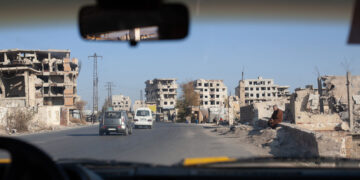Ramzi Kaiss is a legal fellow at MENA Rights Group, a Geneva-based legal advocacy NGO defending and promoting fundamental rights and freedoms in the Middle East and North Africa. He completed his MAS in transitional justice, human rights and the rule of law at the Geneva Academy of International Humanitarian Law and Human Rights.
Ramzi Kaiss is a legal fellow at MENA Rights Group, a Geneva-based legal advocacy NGO defending and promoting fundamental rights and freedoms in the Middle East and North Africa.
عربی
Saudi Arabia is no stranger to political repression, but in the years following Crown Prince Mohammed bin Salman's rise to power, the price to be paid by critical voices in the kingdom has reached exceedingly sinister levels. Last month, MENA Rights Group, a legal advocacy NGO based in Geneva, and ALQST for Human Rights, a London-based organization advocating for human rights in the Gulf, revealed new and harrowing details about the forced disappearance and torture of a Saudi cleric, Sulaiman al-Dowaish—including that he was brought directly to Mohammed bin Salman after his arrest and beaten by the crown prince himself.
A conservative and controversial religious figure in Saudi Arabia, Dowaish was abducted on April 22, 2016, while on a trip to Mecca—just one day after posting a series of tweets that implicitly criticized Mohammed bin Salman, widely known as MBS. He has not been seen in public or heard from since.
Dowaish is not a Saudi dissident by any means. His Twitter account—followed by more than 133,000 people—reflects a strong allegiance to the ruling family, the House of Saud. He has also shown unabashed contempt for protest movements and political opposition in the Shiite-majority areas of the kingdom's eastern province, and a fervent hatred of liberalism and Saudi Arabia's regional foe, Iran.
But in the tweets that apparently provoked his abduction, Dowaish wrote about the dangers of individuals providing "their spoiled sons" with "excessive powers and responsibilities without accountability and oversight." It was, perhaps, a not-so-subtle reference to King Salman and his son, MBS, who at the time was amassing newfound political power after being appointed by his father, a year earlier, as the minister of defense and deputy crown prince. By 2017, MBS was crown prince.
After being detained in Mecca, Dowaish disappeared. According to an eyewitness, he was soon flown to Riyadh, where he was taken, handcuffed and chained, to the office of MBS himself. According to MENA Rights Group's sources, Mohammed bin Salman forced Dowaish onto his knees and began to personally assault him—punching him in the chest and throat, and berating him about his tweets. Dowaish, bleeding excessively from his mouth, lost consciousness.
Dowaish was then kept in an unofficial detention facility located in the basement of a royal palace in Riyadh. According to ALQST's sources, the basement of this palace had been used to imprison and torture high-ranking Saudi officials and rival members of the royal family, by MBS's own entourage. Maher al-Mutreb and Saud al-Qahtani, two members of the notorious "Tiger Squad" hit team responsible for the murder of journalist Jamal Khashoggi and other Saudi dissidents, were in charge of running the secret prison and personally oversaw the torture of Dowaish.
Individuals who were held in the same basement prison as Dowaish, and who were then transferred to other Saudi detention facilities, later informed Dowaish's family that they had been detained with him. They had last seen Dowaish in July 2018. While rumors have swirled about Dowaish, claiming for example that he died in August 2018 after being tortured, that has neither been confirmed nor denied by the Saudi authorities.
So little is known about Dowaish's fate since his abduction took place because the Saudi authorities have endeavored to purposefully erase any evidence of having him in their custody. A few months after his disappearance, Dowaish's family found his name on the registry of prisoners maintained by the General Directorate of Investigations—the shadowy domestic intelligence agency known in the kingdom as the Mabahith—which indicated that he was arrested on April 22, 2016, and was "under investigation."
After several attempts to get more information from the Ministry of Interior, Dowaish's family was informed by a low-ranking official in the ministry that he had been imprisoned and convicted on charges related to "inciting public opinion." Yet a higher-ranking official in the ministry's Office for Security Coordination later denied that. The family was then told by a high-ranking officer of the General Directorate of Investigations that the presence of Dowaish's name in the registry of prisoners was the result of an "error." According to ALQST, the same official informed the family that they should search for Dowaish "in morgues, mental asylums or hospitals" instead.
In another strange and ominous development, Dowaish's family reported receiving two brief phone calls from him in 2018, which were made from a U.S.-based phone number. According to his family, Dowaish claimed to be calling from Turkey on the first call, and then from Syria on the second, and said that he was "traveling to Syria in order to join the Islamic State in Iraq and the Levant." It made little sense to his family, since prior to his abduction, Dowaish had publicly opposed the Islamic State and those joining it. Doubting that the phone calls were legitimate, the family further inquired with a member of the royal family, also a former high-ranking official within the Ministry of Interior, who eventually confirmed to the family that the calls were in fact being made from within Saudi Arabia.
Dowaish's case reflects a growing pattern of Saudi abductions and disappearances. Last month, MENA Rights Group and ALQST for Human Rights filed an appeal on Dowaish's case to the United Nations Working Group on Enforced Disappearances, requesting that it call on the Saudi authorities to clarify his fate and whereabouts.
Five years after his abduction, it is still unclear why Dowaish was disappeared, instead of being brought before judicial authorities for whatever his offense was. Although Saudi courts have long played an instrumental role in efforts to squash any semblance of political opposition in the kingdom, repression under MBS is increasingly being practiced outside of any legal framework. Civil society organizations have reported a troubling new trend since the crown prince came to power: More individuals, like Dowaish, are being held in secret detention facilities where torture is commonplace.
Members of the royal family have not been spared. In January 2018, MBS' cousin, Prince Salman bin Abdulaziz—also known as Salman Ghazalan—was summoned to the royal palace in Riyadh in the middle of the night, where he was beaten and then arrested without being charged. His father, Abdulaziz, was arrested the next day, also without being formally charged. After first being detained for approximately a year in the high-security al-Hair prison south of Riyadh and then put under house arrest, both Salman and his father disappeared in November 2020; their fate and whereabouts remain unknown today. One reported reason for their arrest and abduction, according to The Washington Post, was MBS' jealousy of his cousin, Salman, a prominent international promoter of Saudi culture with a doctorate in law from the Sorbonne, who had also developed influential connections to political elites across Europe.
The U.N. Working Group on Enforced or Involuntary Disappearances recently denounced this new pattern of suppression in Saudi Arabia. In 2020, following an earlier submission by MENA Rights Group, the Working Group issued a report highlighting several impediments to the implementation in the kingdom of the U.N.'s 1992 Declaration on the Protection of All Persons from Enforced Disappearances, concluding that they were "pervasive and deliberate," and "embedded in the institutional and policy framework of Saudi Arabia." The Working Group also condemned the use of detention and disappearances "to suppress beliefs and behaviors that do not align with state-sanctioned political and religious dogma."
Since MBS became crown prince, dozens of royal family members, princes and highly influential figures in the kingdom, in addition to Saudi human rights defenders and critics in civil society, have been subject to an appalling campaign of abductions, forced disappearances, and arbitrary arrests that has also extended, infamously, to murder and alleged assassination attempts. The targets, it seems, are any individuals who dare to criticize MBS and his consolidated power. The arrest and five-year disappearance of a conservative cleric like Sulaiman al-Dowaish who otherwise supports the royal family—for simply a few tweets—speaks volumes about the paranoia with which MBS is ruling Saudi Arabia. No one is safe.
![]()
Photo credit: Mohammed bin Salman, then the deputy crown prince of Saudi Arabia, attends the opening ceremony of the G20 summit in Hangzhou, China, Sept. 4, 2016. (Photo by Nicolas Asfouri – Pool/Getty Images)





































